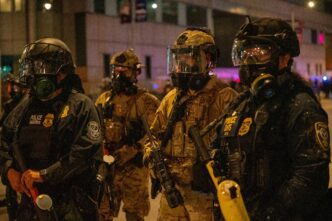The United States has successfully urged the withdrawal of a warning report on imminent famine in northern Gaza, leading to concerns about potential political interference.
The U.S. ambassador to Israel, Jacob Lew, labeled the warning issued by a globally recognized famine monitoring group as “inaccurate and irresponsible.” This development comes amid the ongoing conflict in Gaza and highlights a rare public disagreement between the Biden administration and the U.S.-funded Famine Early Warning System (FEWS). This system is known for its objective, data-driven assessments of global food crises.
The initial report warned of an imminent famine in northern Gaza due to Israel’s blockade. However, after the U.S. intervention, the organization retracted the warning. Humanitarian and rights groups have voiced concerns over potential U.S. influence on the independent monitoring system. The U.S. Embassy and State Department have not commented, while FEWS officials have remained silent on the issue.
Ambassador Lew and the U.S. Agency for International Development (USAID) argued that the report failed to consider the swiftly changing conditions in northern Gaza. Lew emphasized the U.S. commitment to addressing humanitarian needs in the area, criticizing what he described as “outdated and inaccurate” data.
The report initially forecasted that between two and 15 people might die daily from starvation or related causes unless Israeli policy changed. Such findings would have significant implications, as they could suggest that more than 10,000 people remain in northern Gaza despite recent displacements. USAID reviewed the report prior to its release, highlighting discrepancies in population estimates and other data issues. The agency requested a revision to address these concerns before publication, but according to USAID, FEWS proceeded regardless.
Critics, including officials from humanitarian organizations like Oxfam America, have accused the U.S. of using political leverage to downplay the severity of the situation in Gaza. Kenneth Roth, a former executive director of Human Rights Watch, noted that FEWS was intended to provide assessments free from political bias, and the current situation appears to contradict that mission.
Israel claims that it targets Hamas militants in Gaza and asserts that the majority of civilians have relocated to areas where aid is more accessible. Nevertheless, reports indicate significant difficulties in delivering aid due to ongoing military operations and restrictions imposed by Israeli authorities. Despite these challenges, the U.S. has reportedly pressured Israel to enhance aid flow, though with limited success.
Humanitarian groups have repeatedly raised alarms about the dire conditions in northern Gaza, exacerbated by the long-standing conflict. The international community continues to monitor the situation closely, advocating for increased humanitarian access and support.
This incident underscores the complexity of international humanitarian efforts in conflict zones like Gaza. The divergent views between the U.S. and famine monitoring entities highlight the intricate balance between political considerations and humanitarian needs. The ongoing dialogue and scrutiny ensure that the needs of vulnerable populations remain in focus amid geopolitical challenges.
Source: Nbcmiami








